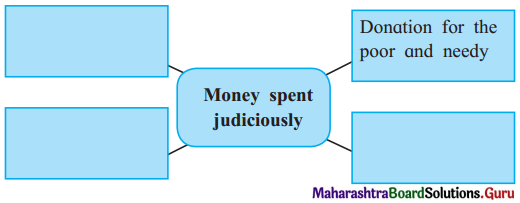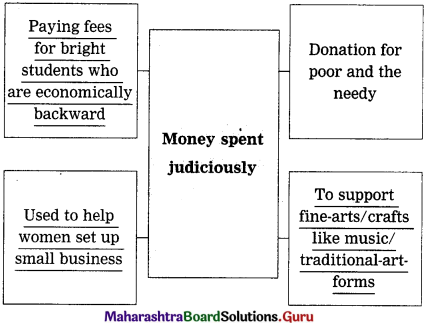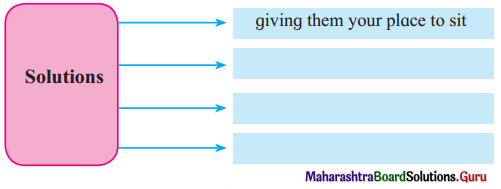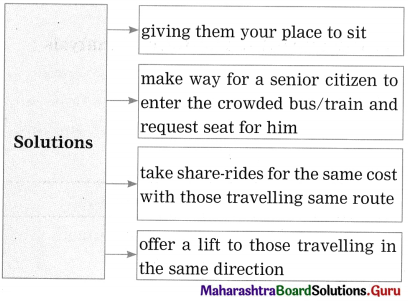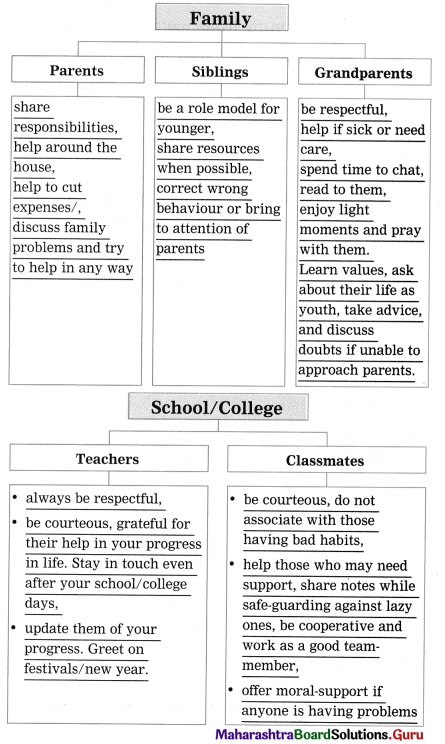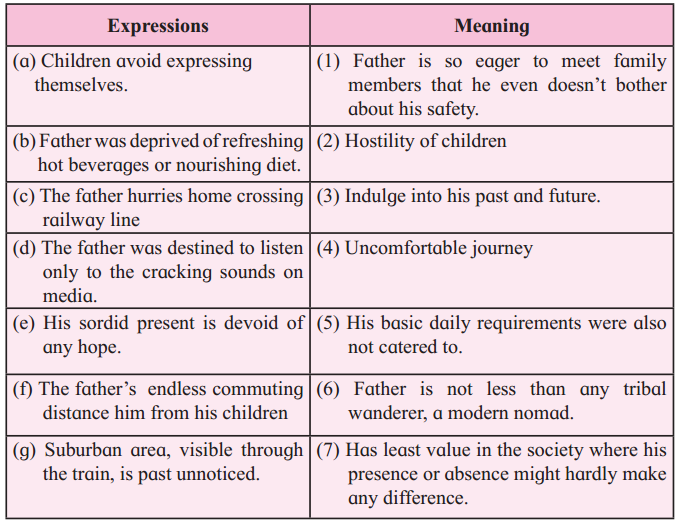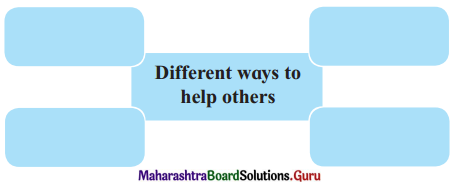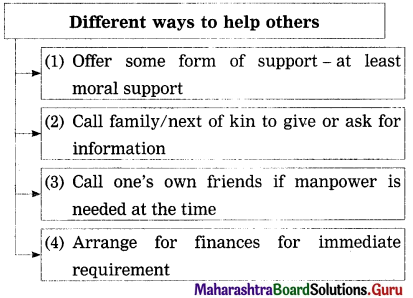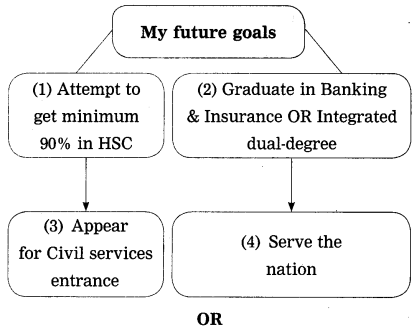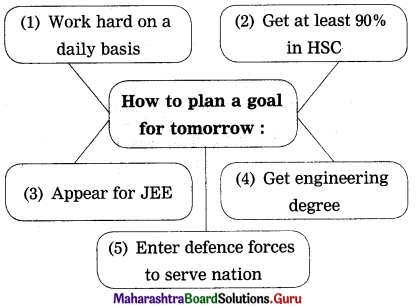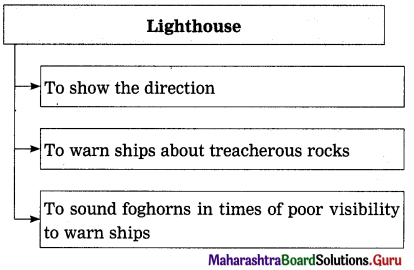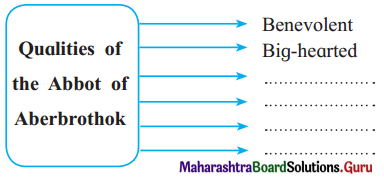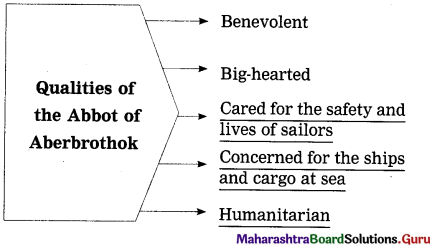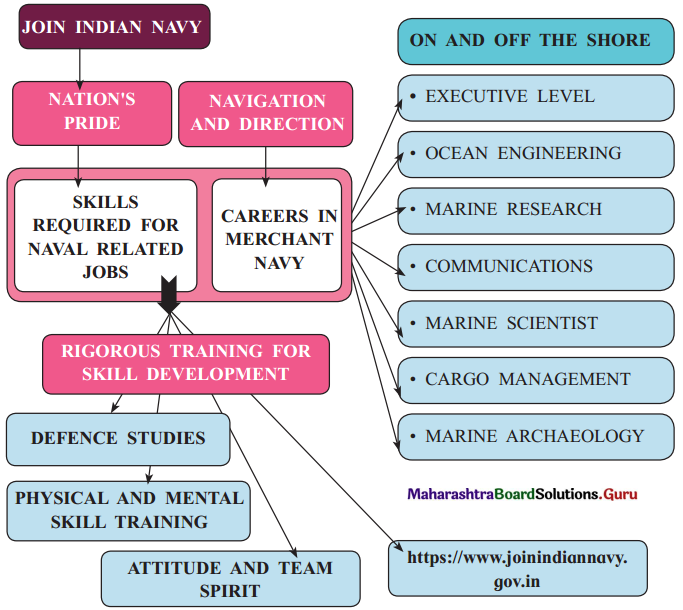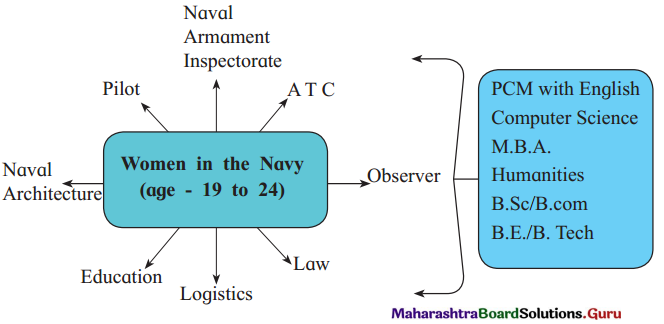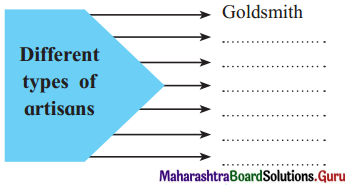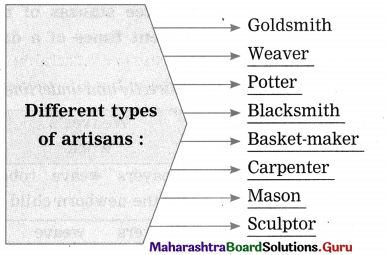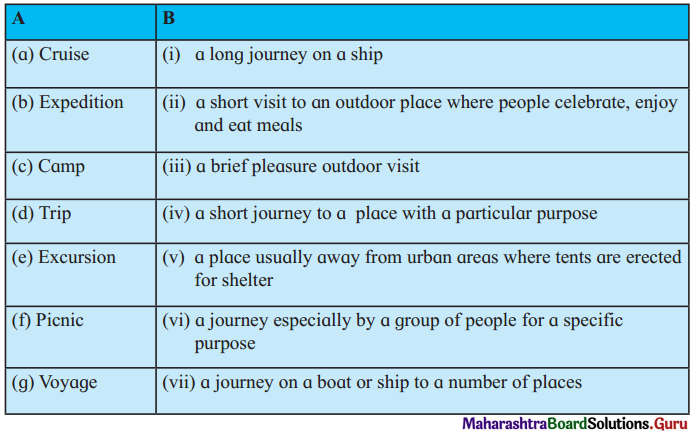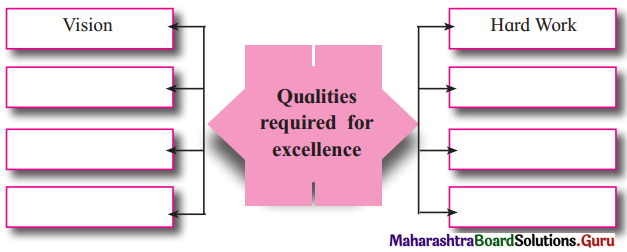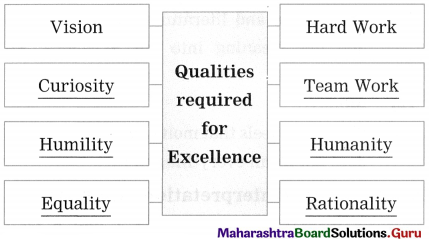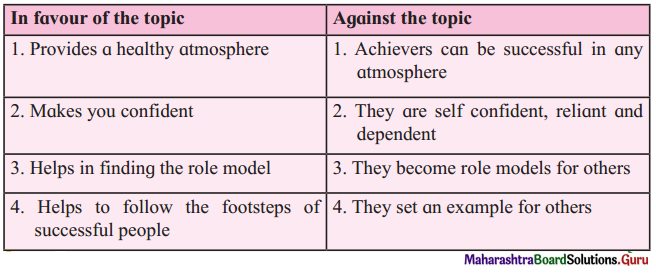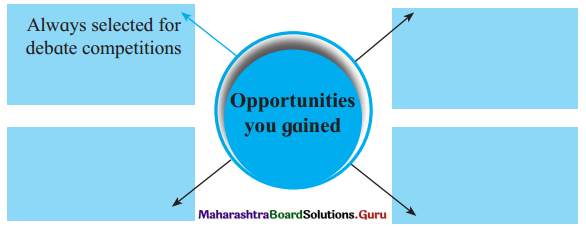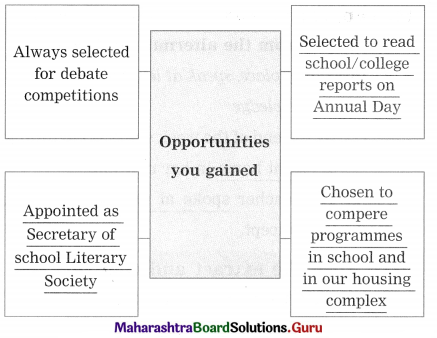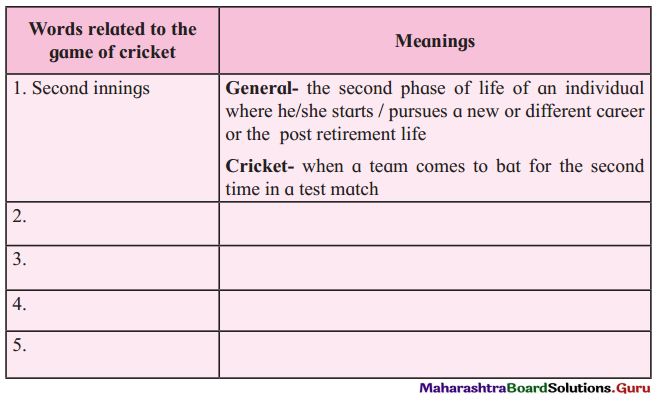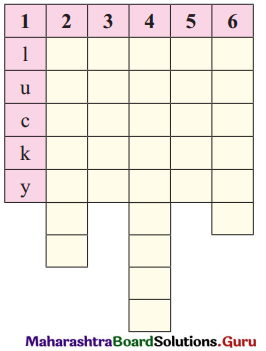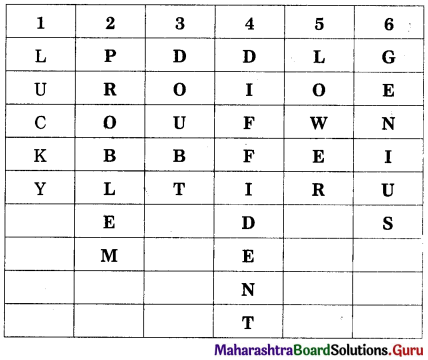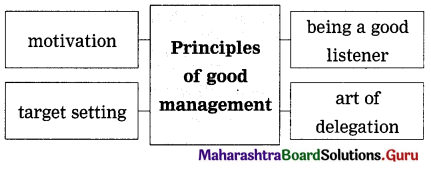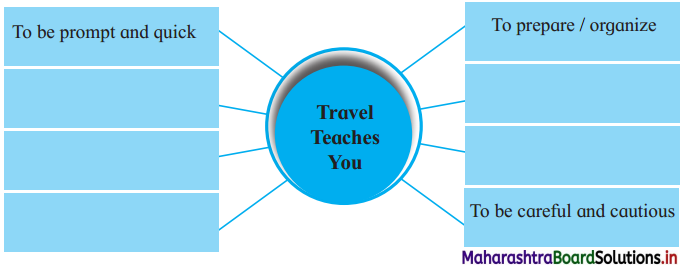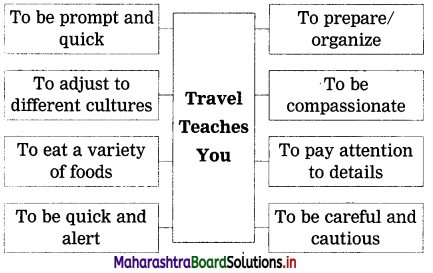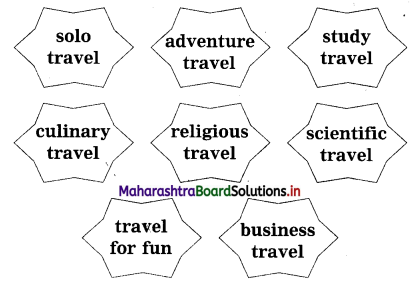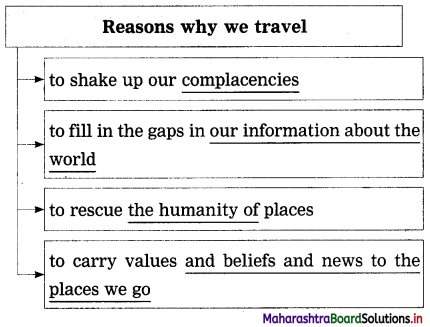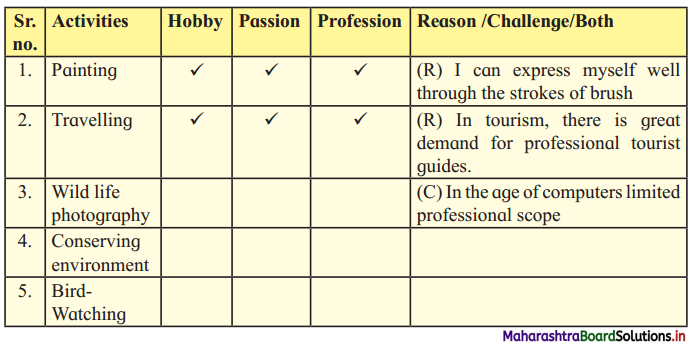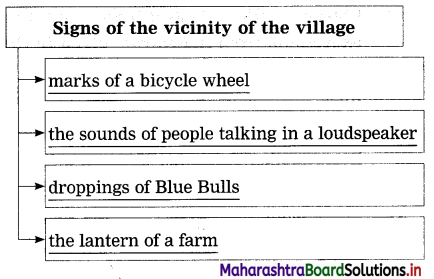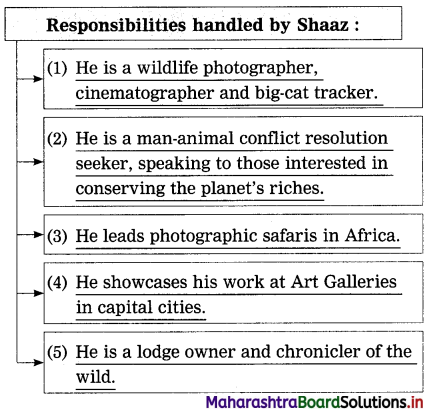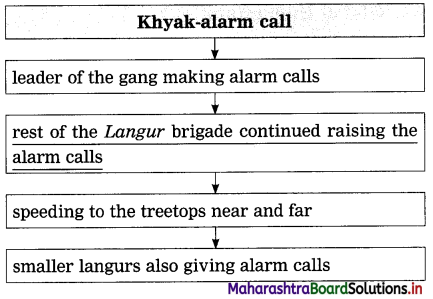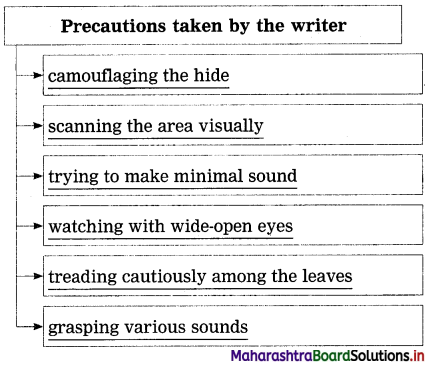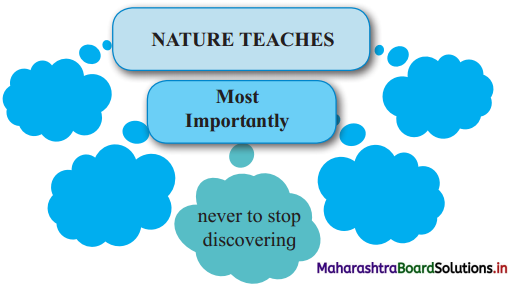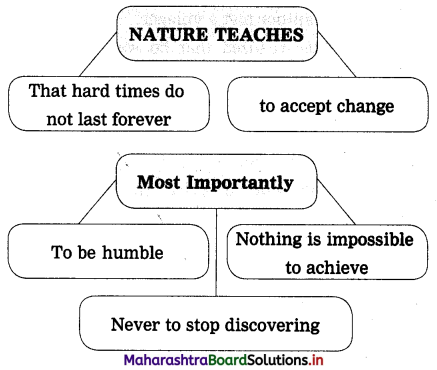Class 12 English Chapter 2.7 She Walks in Beauty Question Answer Maharashtra Board
Balbharti Yuvakbharati English 12th Digest Chapter 2.7 She Walks in Beauty Notes, Textbook Exercise Important Questions and Answers.
12th Std English Chapter 2.7 Brainstorming Question Answer
12th English Digest Chapter 2.7 She Walks in Beauty Textbook Questions and Answers
Question 1.
While judging any person you would consider certain aspects. Complete the diagram after carefully thinking what aspects you would consider:
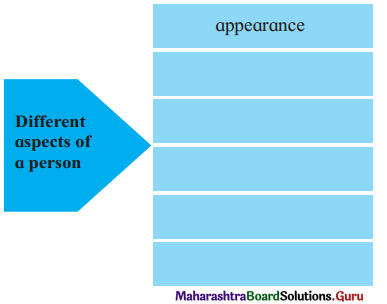
Answer:
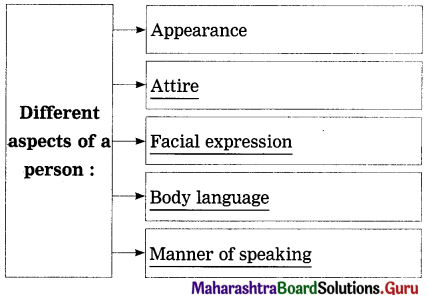
![]()
Question 2.
Make a list of proverbs and quotations related to ‘Beauty’.
Answer:
(a) Beauty is in the eye of the beholder.
(b) Beauty is only skin deep.
(c) Beauty is as beauty does.
(d) There is beauty in simplicity.
(e) Beauty is not in the face, it is a light in the heart.
Question 3.
Discuss your impressions about someone’s personality, and say what you like the most and why-
Answer:
The personality that captures the attention of all who meet her is Ms Murti.
- Simplicity and warmth: She is a brilliant engineer, extremely wealthy yet is simple, and so cheerful and warm in her interaction with anyone she meets.
- Humbleness: In spite her achievements, wealth and position she never mentions them, rather praises the efforts and achievements of others
- Elegance: She is graceful and elegant and yet is never dressed expensively.
- Motivational: She addresses young people and students in a way that is always encouraging and uplifting.
- Generous: She is generous in giving those who are disadvantaged. She donates for the emancipation of women for making them economically independent.
(A1)
Question (i)
‘Beauty lies in the eyes of the beholder’ – you have probably heard this saying. Discuss in your class how far the statement is true.
Points:
- Outward appearance gives only an idea
- There may sometimes be an exception to the rule ‘first impression is the best
- The external look may be completely different if one looks deeper
- Henry Ford [founder of Ford Automobiles] dressed in the same old suit and said, ‘people who know me know who I am. People who don’t know me don’t matter, A very wealthy person may choose to appear very ordinary.
Question (ii)
Discuss with your partner about the most inspirational person you have come across. Also explain the reasons behind your opinion.
Points:
- Attended a lecture by A.P.J. Abdul Kalam, before he became President
- His views stayed in my mind
- He stressed on dreaming for high aims
- He stressed on the importance of hard work
- He came from very humble background
- He worked his way to achieve great things
- I also want to achieve something and I have a lot of support which Dr. Abdul Kalam may not have had.
![]()
(A2)
Question (i)
Match column A with column B:

Answer:
- The lady’s beauty – a cloudless starry night
- Her hair – wavy and black
- Her eyes – a perfect blend of light and darkness
- Her smile – soft, calm and eloquent
- Her mind – at peace with all below a heart
- Her face – expresses thoughts serenely and sweetly
Question (ii)
Complete the reasons:
The lady in the poem has a winning smile and a glowing skin. According to the poet she is blessed with these things. Explain why.
Answer:
The lady in the poem has a winning smile and a glowing skin. According to the poet she is blessed with these things because in the last stanza the poet says that lovely cheek, the calm brow, the delicate colouring, the glowing skin all are a result of her life spent without sin. She has a peaceful mind and an innocent heart. These come together to make her face glow with an inner beauty.
![]()
Question (iii)
The poet brings a perfect balance of outer beauty and inner beauty. Write a few lines from the poem on how the poet brings this balance in his description.
Answer:
One of the themes in the poem is harmony or balance. The poet does not directly call her beautiful, but she ‘walks in beauty’. The overall beauty is compared to a combination of cloudless (clear) climate and starry skies. He says the best of dark and light meet in her eyes and features, to be seen in the soft, dim light. The effect would not be so wonderful if it was even one shade darker or brighter. That balance of the light is important.
The poet says that her calm brow, sweet smile, the lovely colour of her skin, is the result of a peaceful mind, a loving heart and a pure life. Inner beauty is reflected in this ‘nameless grace’ – indescribable beauty.
Question (iv)
‘Beauty is skin deep.’ Do you agree with the statement? Or do you feel that beauty comes from within? Explain your views in a few sentences.
Answer:
I agree with the statement. Beauty is not about perfect features, clear skin, shining hair or smart clothes. Beauty is about the person’s heart. The helpful nature, a mind without guilt, a cheerful attitude, kind way of speaking will all be reflected in the person’s outward appearance.
The eyes are windows to a person’s soul, they say. If a person has wicked thoughts and bad intentions it shows in the eyes. The expression on the face will reflect the nasty mind. Harsh words will show their unkind nature. So beautiful features and perfect skin are not real indicators of beauty.
(A3)
Question (i)
Find out from the poem the words which are used to describe the lady.
Answer:
- Raven tresses
- Serene and sweet expression
- Pure thoughts
- Dearheart
- Calm brow
- Smiling face
- Gowing skin
- Innocent heart
- Peaceful mind
Question (ii)
Find out the instances of contractions from the poem.
Answer:
The contractions in the poem are – ‘that’s’ – that is ‘o’er’ – over
![]()
(A4)
Question (i)
The poet creates imagery of light and darkness to bring out the beauty of the lady. Find out the lines with such imageries and complete the table:
Answer:
| Lines with imagery | Reason for using |
| 1. And all that’s best of dark and bright | To express the beauty of the eyes |
| 2. Thus mellowed to that tender light – heaven to gaudy day denies | To convey the dim soft light of evening not the harsh brightness of the day |
| 3. One shade the more, one ray the less | To stress the perfect balance between darkness of night and the glare of day |
Question (ii)
Find out from the poem examples of:
(a) Simile
(b) Metaphor
(c) Alliteration
(d) Personification
(e) Antithesis.
Answer:
| Figure of speech | Example | (Explanation) |
| 1. Simile | like the night of cloudless climes and starry skies | (Her beauty Is directly compared to the cloudless starry skies.) |
| 2. Metaphor | in every raven tress | (Her hair-tress – is shiny and jet black like a raven’s colour.) |
| 3. Alliteration | Cloudless climes and starry skies | (The ‘c’ sound and ‘s’ occur in adjacent words for poetic effect.) |
| 4. Personification | eloquent, The smiles that win | (The beautiful woman does the act of smiling, which wins hearts.) |
| 5. Antithesis | 1. best of dark and bright 2. One shade the more, one ray the less | (Words of opposite meanings are used for poetic effect.) |
![]()
(A5)
Question (i)
Write an appreciation of the poem considering the following points :
- About the poem / poet / title
- Theme
- Poetic devices, language, style
- Special features – tone and type
- Values, message
- Your opinion about the poem
Answer:
Lord Byron’s poem opens with the same words that form the title: “She walks in beauty.” These four simple words quickly create an atmosphere of admiration and mystery. It is a short eighteen line poem having three sestets (six lines) in praise of an unnamed woman. The poet uses several poetic devices to express how deeply he is impressed.
There are several themes. One is of course beauty. Each feature of the woman – her eyes, her black (raven) tresses, her soft cheek, her calm brow and the lovely colour of skin is praised. The poet speaks of harmony. He speaks of the perfect blend of day and night, of light and dark. He speaks of the ‘mellowed’ or tender light which makes the beauty so rare, delicate and astonishing.
The other theme is the inner beauty which is what brings the outer beauty. He mentions ‘heaven’ [line 6] which may point to a divine side to the beauty. If a person is sinless their mind is pure and calm. There is no evil so the innocence inside causes the outer beauty which is indescribable – ‘nameless grace [line 8]
The poet uses simile [line 1] ‘like the night..’, alliteration – ‘cloudless climes’, ‘starry skies’. There is rhyme ababab in all the sestets. He uses metaphor -raven tress [line 9], and personification – ‘smiles that win’ [line 15]. There are many examples of antithesis through which the poet stresses on balance.
There is harmony of light – ‘dark and bright’, ‘tender light -gaudy day’, ‘one shade more, one ray less’. These are to emphasize that the beauty is not only physical and external, but actually because there is inner beauty. The mind is calm, the heart is innocent and this causes the outer beauty which is seen by him.
The poem is lyrical, has a steady rhythm and the language is rich with poetic devices. Though the poet does not name the woman, or give any details of her age, his admiration is felt in the tone. The message is about the importance of inner beauty, which is almost a divine thing that will make external beauty possible.
I feel the poem makes us realize that one should look deeper than just outward appearance. One should appreciate beauty in its entirety.
Question (ii)
Compose a poem of at least 4-6 lines on ‘Beauty of Nature’.
Answer:
Beauty of Nature
I look up at the majestic peaks I peer into the sapphire deeps I gaze at the endless shades of green My eyes drink the silver threads between.
In this life God I’m quite sure we can see Why? He’s everywhere in Nature’s beauty!
![]()
Question (iii)
Write at least one paragraph and expand the inherent idea of the saying ‘A Thing of Beauty is a Joy Forever’.
Answer:
A Thing of Beauty is a Joy Forever
We all love beauty. We are instantly attracted toward anything beautiful. Even children are drawn toward something pretty. We admire its qualities like lovely colour or soft texture. We admire something beautiful created by someone, like a painting or sculpture. We exclaim on the realistic appearance and the artist’s skill. We appreciate beauty in nature. Gorgeous flowers, majestic mountains, the green of hills and the charming waterfalls. We enjoy the sweetness of fruits.
To create something beautiful requires patience, effort and care. When all these come together the result is beautiful. We appreciate it whether it is in nature or is man-made. Our ears keenly listen to birds calling in the morning, melodious music, the rush of waves and the splashing of rain. Thus all our senses are attracted and we feel good when we see, hear or taste something. It brings us happiness.
Thus a thing of beauty is a joy forever.
![]()
(A6)
Question (i)
Browse the internet and find out different types of poems on ‘Beauty’.
Question (ii)
Byron’s name is often taken along with his two contemporaries – Shelley and Keats. Go to your school/college library and read some poems written by P. B. Shelley and John Keats to get a better idea about the Romantic Poets.
Yuvakbharati English 12th Digest Chapter 2.7 She Walks in Beauty Additional Important Questions and Answers
Read the poem and complete the given activities:
Global Understanding:
Question 1.
Complete the following:
The colour of the lady’s hair is
Answer:
The colour of the lady’s hair is shiny black (like a raven’s).
![]()
Interpretation/Inference/Analysis:
Question 1.
Complete the following:
Answer:
The phrase ‘dwelling – place’ refers to her mind. The poet says that her face sweetly expresses her thoughts and says that the dwelling place of those thoughts (expressed by the face) is very dear. The dwelling place of thoughts is the mind.
English Yuvakbharati 12th Full Digest Section 2 (Poetry)
- Song of the Open Road Class 11 English Solutions
- Indian Weavers Class 11 English Solutions
- The Inchcape Rock Class 11 English Solutions
- Have you Earned Your Tomorrow Class 11 English Solutions
- Father Returning Home Class 11 English Solutions
- Money Class 11 English Solutions
- She Walks in Beauty Class 11 English Solutions
- Small Towns and Rivers Class 11 English Solutions
